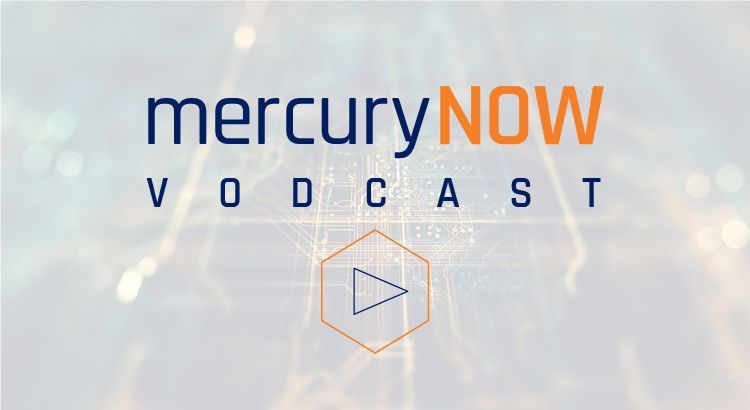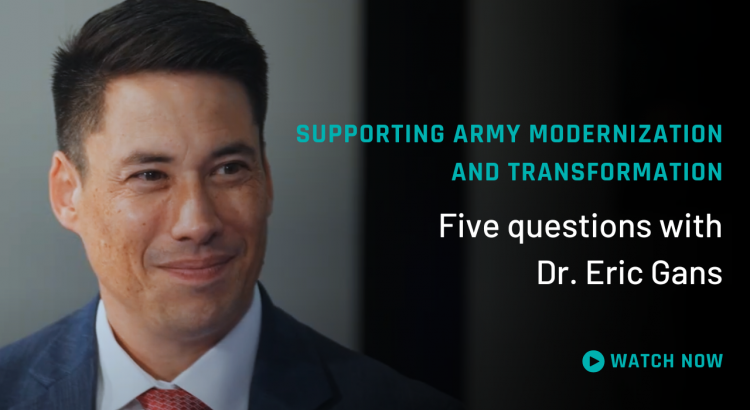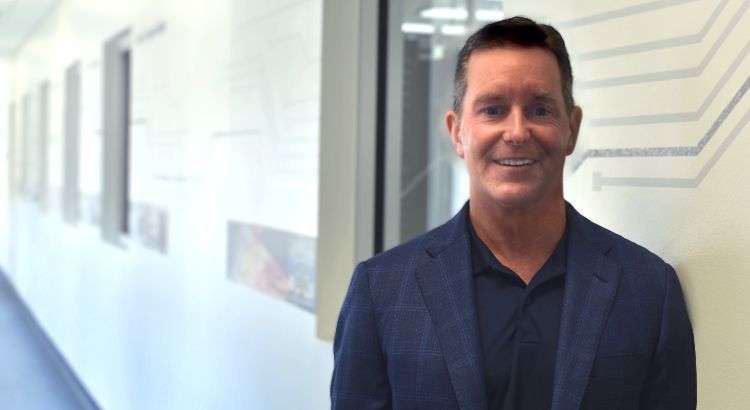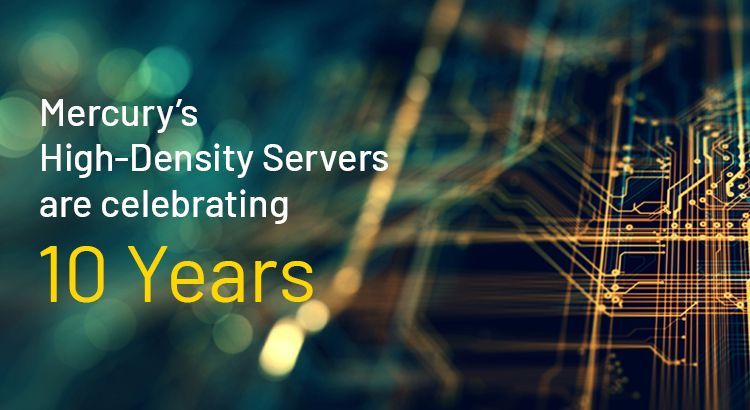
Women leaders at Mercury: Cultivating hope. Building confidence. Raising optimism.
Mercury Systems
March 15, 2021
For 42 years, the Simmons Leadership Conference has engaged, impacted and inspired over 100,000 leaders from around the world. For 2021, the conference explores resilience and authenticity. Three women leaders at Mercury join us to discuss their experiences and share insights as they work to cultivate hope, build confidence and raise optimism for other women in business.
Ralph Guevarez: Hello and welcome to Mercury Now. I am your host, Ralph Guevaras. Thank you for joining me. For 42 years, the Simmons Leadership Conference has engaged, impacted and inspired over a 100,000 leaders from around the world. This year, the conference will be exploring resilience and authenticity and bringing to life the best understanding of these concepts for practical and inspired applications. Mercury is very proud to be a gold sponsor of the 2021 Simmons Leadership Conference. Our guests today are three women leaders at Mercury who joined us to discuss their experiences and share their insights as they work to cultivate hope, build confidence, and raise optimism for other women in business. And they're going to do that here on Mercury Now. Joining me today are Michelle McCarthy, Stacy Spencer, and Lynne Currier. Ladies, good day, and welcome to the show.
Michelle McCart...: Hey Ralph, Thanks for having us.
Lynne Currier: Hi, Ralph. It's great to be here.
Stacy Spencer: Hi Ralph. It's good to see you again.
Ralph Guevarez: Thank you all for your time. Now, before we begin, can each of you please give our listeners a brief background on your current role at Mercury. Michelle, let's start with you.
Michelle McCart...: Sure, Ralph. I'm currently the vice president and chief accounting officer here at Mercury. I've been with the company three years. I oversee the accounting and global order services function, which is made up of about 50 incredible team members. My team and I are responsible for filing our quarterly financial statements. In order to do that, we perform a quarterly close internal controls testing and work closely with our auditors. My team and I are also responsible for the administration of payroll stock plans, treasury, insurance, taxes, and customer orders.
Ralph Guevarez: Thank you, Michelle. Lynne, please a brief background.
Lynne Currier: I'm currently the vice president of engineering, responsible for approximately 350 engineers across the mission division. And our engineers are located around the world, Toronto, Alpharetta, Mesa, Torrance, California, Geneva, Switzerland, and Madrid, Spain. Emission has three product lines, displays, systems, and computing.
Ralph Guevarez: Thank you. And Stacy, please, a brief background.
Stacy Spencer: Sure. I'm vice president of strategic and global accounts within our global sales organization. I've been with the company for almost 11 years now and I manage a team of sales and business development professionals who are focused on driving growth and customer satisfaction within our most strategic customers.
Ralph Guevarez: Very impressive. All backgrounds. Thank you very much for your time. Let's begin the discussion shall we. Lynne, let's start with you. You're a female engineer and a leader in not only STEM, but also in the defense industry, both predominantly populated with men. At the beginning of your career, did you think you were going to face more challenges than your male counterparts? And if so, how did you prepare for that and continue to advance in your career?
Lynne Currier: It's funny when I was in college, my advisor was also my professor. In the first month of my freshman year, he told the class that he selects one student to answer every question for the entire lecture. And I was the only woman in the room and he selected me. And I was terrified, but I was able to answer most of the questions. And so this help me to have more confidence and it broke the ice for me for the future, with my male classmates. By the way, he never picked another person to answer all the questions again.
Ralph Guevarez: Thank you, Lynne. Great story. I'd like to pose another question to you. In your professional career, did you ever find yourself hesitant to speak up because you were the minority voice and if so, what did you do to overcome that?
Lynne Currier: Well, I was blessed with many good managers over my career who supported me and gave me opportunities to have my voice be heard. In my first software development job out of school, my manager at Honeywell, he asked me to represent the team for processes and internal audits. And I had to go to all the training to learn about these things. Give updates every week to the team and then teach everybody else on the team. So this quickly taught me to speak up and make a difference.
Ralph Guevarez: Thank you, Lynne. Let's go to Michelle next. Now the theme of the Simmons Conference is authenticity and resilience. Now as a veteran in corporate finance, can you give an example of how you as a leader, bring authenticity to life in the workplace?
Michelle McCart...: Sure, Ralph. Authenticity is a critically important trait in finance and accounting. Investors have to trust the organization and the management team where they're investing their capital. So exercising, the utmost integrity in my organization is non-negotiable. You have to apply consistent and unbiased judgment in our decisions and ensure our financial statements are compliant and correct. But equally important is authenticity from a people standpoint, being honest and real with one another builds trust, which leads to building strong relationships. And it's those relationships that yield extraordinary outcomes. And we see that all the time at Mercury. Whether it's a technological breakthrough, exceeding our financial targets, or implementing a system initiative. A leader doesn't evolve by doing everything themselves, they empower others and they create a sum of parts that's greater than the whole. Creating that value stems from authenticity.
Ralph Guevarez: Thank you, Michelle. Now I'd like to ask you the same question. Did you ever find yourself hesitant to speak up because you were the minority voice? And if so, what did you do to overcome that?
Michelle McCart...: So surprising as it may be to my team and others that I work with, the answer is yes. Aside from being a female, that's constantly worked in male dominated industries, I've also consistently been one of the younger and therefore less experienced people in the room. And so I set a very high bar for speaking only when I feel I had something really valuable to say. So over the years though, I was told I should speak up more and that my questions and my ideas were highly valued and that my diversity of thought was welcome. I also learned that others were often thinking the same thing, but didn't have the courage to speak up either. And that's what triggered me to change. To try to serve as a voice not for myself, but for others until they were ready to use their own voice. There are some settings that I still find really terrifying, like investor conferences, which I have to work on when I grow.
Ralph Guevarez: Thank you, Michelle. Now, Stacy, you've spent a lot of years traveling and selling alongside male counterparts. Now, is there a different standard for authenticity for women than there is for men? Are women held to different standards of authenticity to men? Your thoughts, please.
Stacy Spencer: Ralph, I've spent all of my career in male dominated companies and industries, and I wouldn't change a thing. I've worked with great men and women. I wouldn't say that women are necessarily held to a different standard, but as a professional woman, I'm always aware of how I come across and perhaps I'm more guarded at times.
I'll give you a specific example that happened a few years ago. I remember a time where I was the only woman in the room and it was a meeting of C-level executives. During this meeting, a man used humor to open his briefing. And his humor, it was appropriate, it was funny, and it was sort of a clever way to get the people in the room to engage. But in that moment, I wonder, could I tell a joke like that as a 40 something year old woman? Or does that only work for a 60 something year old man? They think he's funny, but would they think that I'm a ditz? And while I do my best to be authentic, particularly as a people manager, I admit that there are times when I've held back some of my own authenticity.
Ralph Guevarez: Now, that's an interesting point, Stacy. And thank you for sharing that. So did you ever find yourself hesitant to speak up because you were the minority voice? And if so, what did you do to overcome that?
Stacy Spencer: Well, Ralph, I've never found myself hesitant to speak up. Part of that is just my wiring as an outgoing, passionate extrovert. With that said, I think there have been times that I spoke up too loud, too often, too passionately, probably out of fear of not being heard. And perhaps there've been times when I argued my point too much because I felt like I was being dismissed. Or I felt like I had to secure my seat at the table. As I progressed in my career, I'm more aware of these feelings and behaviors.
Ralph Guevarez: Thank you, Stacy. Now going around the horn, what advice do each of you have for emerging female leaders to gain the respect of their colleagues without compromising their authenticity in any way? Let's start with you Lynne.
Lynne Currier: Stay true to who you are and keep your priorities in livestream. It's hard to juggle a career, children, and taking care of yourself. So set some boundaries to make sure that you have time for all of them. And be honest in constructive way if there's a challenge or a conflict.
Ralph Guevarez: Thank you, Lynne. That's great advice for all of us. Michelle, same question please.
Michelle McCart...: Sure. So authenticity is defined as being true to your own personality, values, and spirit, regardless of the pressure that you're under to act otherwise. So my advice to female leaders is to know yourself, know your strengths, take confidence in them. But also know your weaknesses, your blind spots. And accept support or feedback from others. Know your moral principles and values that you never want to compromise. Write them down and review them when you're faced with a difficult decision that may bring them into question. Know what you don't know, and don't be afraid to admit it. When I joined Mercury, I was asked what makes a great leader. My response was something I'd love to share. A great leader is humble enough to never presume to have all the answers. Courageous enough to make decisions with less than perfect information. And curious enough to maintain a constant desire to learn. A great leader instills knowledge, confidence, and faith in the people she leads in hopes that they will become even greater leaders.
Ralph Guevarez: Another piece of great advice. Thank you, Michelle. Stacy, please. Same question to you.
Stacy Spencer: Yeah. So Ralph, I think that if you want to gain the respect of your colleagues, you can't just be excellent at what you do. Relationships matter. You have to be yourself and take time to invest in the relationships around you. People think of networks as things you do outside of your current employer. I encourage folks to build a network inside of Mercury as well. There's a lot to be learned from one another, whether it's about work, or life, or hobbies. And having a diverse internal network will help you see situations more broadly. And it can also be a great sense of connection and support. I've spent over a decade at Mercury and I'm so grateful for the dedicated, smart, and diverse group of people in my network. And I'm also inspired by the talented people who are joining Mercury today.
Ralph Guevarez: Thank you, Stacy. I agree with you completely. We are certainly fortunate to have a great group of talented team members who inspire, support, and really care about one another at Mercury. And we are exceptionally lucky to have so many accomplished women like all of you who continue to rise to the challenges and emerge more powerful and resourceful and successfully delivering on our purpose. Innovation that matters by and for people who matter. Stacy, Michelle, Lynne, thank you for your time.
Michelle McCart...: Thank you.
Lynne Currier: Thank you.
Stacy Spencer: Thank you.







 I’ll take my data center to go, please: Celebrating 10 years of deployable data center performance
I’ll take my data center to go, please: Celebrating 10 years of deployable data center performance Five things to ask before buying a server cluster for edge computing
Five things to ask before buying a server cluster for edge computing